几组常见英语词语辨析
- 格式:docx
- 大小:15.12 KB
- 文档页数:2
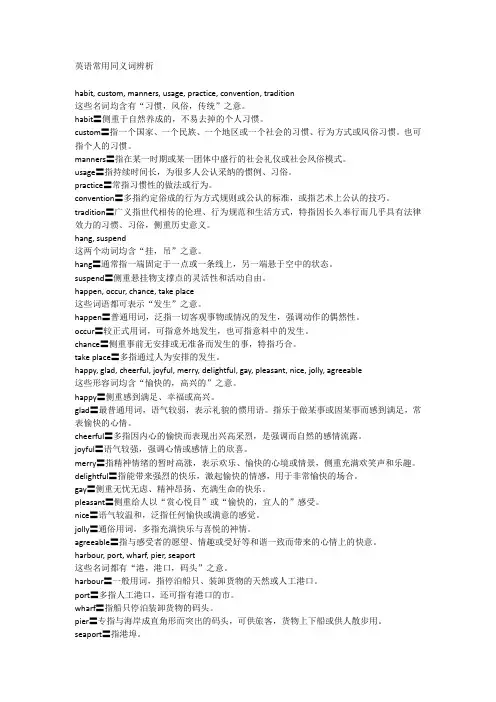
英语常用同义词辨析habit, custom, manners, usage, practice, convention, tradition这些名词均含有“习惯,风俗,传统”之意。
habit〓侧重于自然养成的,不易去掉的个人习惯。
custom〓指一个国家、一个民族、一个地区或一个社会的习惯、行为方式或风俗习惯。
也可指个人的习惯。
manners〓指在某一时期或某一团体中盛行的社会礼仪或社会风俗模式。
usage〓指持续时间长,为很多人公认采纳的惯例、习俗。
practice〓常指习惯性的做法或行为。
convention〓多指约定俗成的行为方式规则或公认的标准,或指艺术上公认的技巧。
tradition〓广义指世代相传的伦理、行为规范和生活方式,特指因长久奉行而几乎具有法律效力的习惯、习俗,侧重历史意义。
hang, suspend这两个动词均含“挂,吊”之意。
hang〓通常指一端固定于一点或一条线上,另一端悬于空中的状态。
suspend〓侧重悬挂物支撑点的灵活性和活动自由。
happen, occur, chance, take place这些词语都可表示“发生”之意。
happen〓普通用词,泛指一切客观事物或情况的发生,强调动作的偶然性。
occur〓较正式用词,可指意外地发生,也可指意料中的发生。
chance〓侧重事前无安排或无准备而发生的事,特指巧合。
take place〓多指通过人为安排的发生。
happy, glad, cheerful, joyful, merry, delightful, gay, pleasant, nice, jolly, agreeable这些形容词均含“愉快的,高兴的”之意。
happy〓侧重感到满足、幸福或高兴。
glad〓最普通用词,语气较弱,表示礼貌的惯用语。
指乐于做某事或因某事而感到满足,常表愉快的心情。
cheerful〓多指因内心的愉快而表现出兴高采烈,是强调而自然的感情流露。
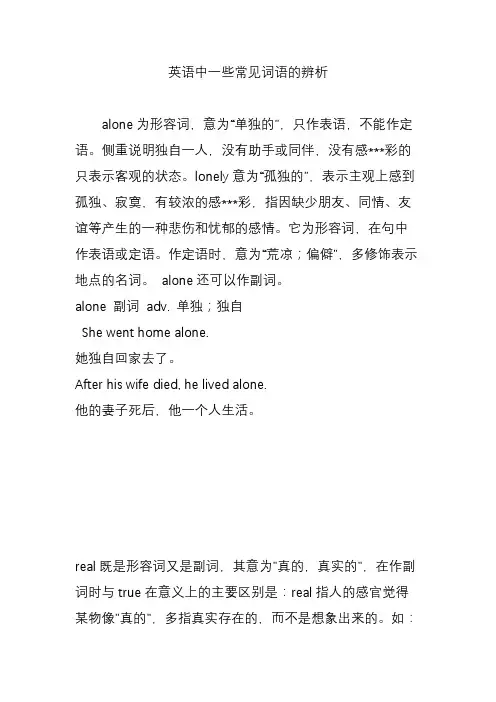
英语中一些常见词语的辨析alone为形容词,意为“单独的”,只作表语,不能作定语。
侧重说明独自一人,没有助手或同伴,没有感***彩的只表示客观的状态。
lonely意为“孤独的”,表示主观上感到孤独、寂寞,有较浓的感***彩,指因缺少朋友、同情、友谊等产生的一种悲伤和忧郁的感情。
它为形容词,在句中作表语或定语。
作定语时,意为“荒凉;偏僻”,多修饰表示地点的名词。
alone还可以作副词。
alone 副词adv. 单独;独自She went home alone.她独自回家去了。
After his wife died, he lived alone.他的妻子死后,他一个人生活。
real既是形容词又是副词,其意为"真的,真实的",在作副词时与true在意义上的主要区别是:real指人的感官觉得某物像"真的",多指真实存在的,而不是想象出来的。
如:Was it real or was it a dream? 这是真的还是个梦?true既是形容词也是副词,意思是"真实的,真正的",其意义与real的区别是:true的"真实"是建立在已知的事实基础上,指与实际相符,不是"发明"或"编造"出来的。
如:This is a true story. 这是一个真实的故事。
Is the news true? 这消息是真的吗?a movie based on a true story 一个以真实故事为背景的影片true与real在某些情况下也可以通用,如在表示一件事情的实际情况与真实情况不符时,true与real都可以用。
如:Tell me the real/true reason why he resigned. 告诉我他辞职的真实原因。
He seems quiet but reveals his true/real character on the football field. 他看起来很安静但是在足球场上却展现了他真实的一面。
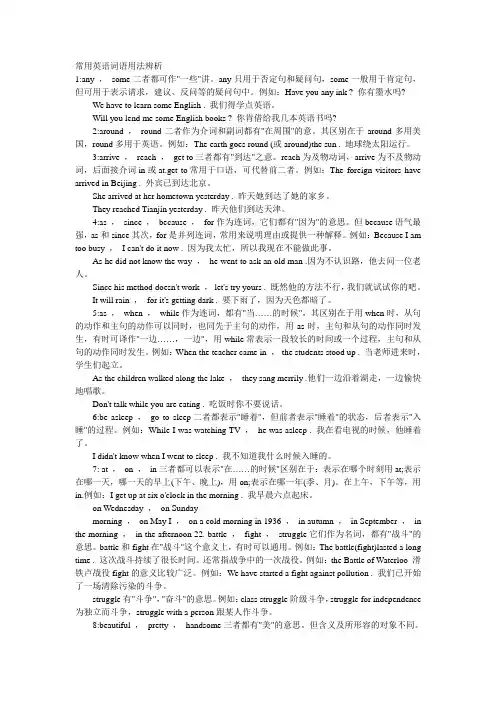
常用英语词语用法辨析1:any ,some二者都可作"一些"讲。
any只用于否定句和疑问句,some一般用于肯定句,但可用于表示请求,建议、反问等的疑问句中。
例如:Have you any ink ? 你有墨水吗?We have to learn some English . 我们得学点英语。
Will you lend me some English books ? 你肯借给我几本英语书吗?2:around ,round二者作为介词和副词都有"在周围"的意。
其区别在于around多用美国,round多用于英语。
例如:The earth goes round (或around)the sun . 地球绕太阳运行。
3:arrive ,reach ,get to三者都有"到达"之意。
reach为及物动词,arrive为不及物动词,后面接介词in或at.get to常用于口语,可代替前二者。
例如:The foreign visitors have arrived in Beijing . 外宾已到达北京。
She arrived at her hometown yesterday . 昨天她到达了她的家乡。
They reached Tianjin yesterday . 昨天他们到达天津。
4:as ,since ,because ,for作为连词,它们都有"因为"的意思。
但because语气最强,as和since其次,for是并列连词,常用来说明理由或提供一种解释。
例如:Because I am too busy ,I can't do it now . 因为我太忙,所以我现在不能做此事。
As he did not know the way ,he went to ask an old man .因为不认识路,他去问一位老人。
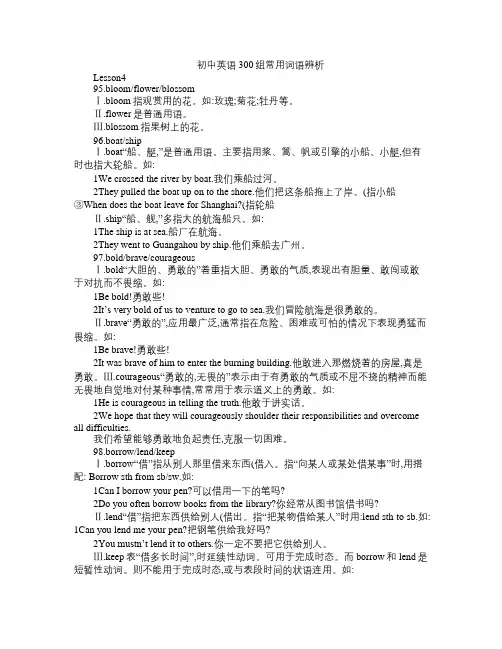
初中英语300组常用词语辨析Lesson495.bloom/flower/blossomⅠ.bloom指观赏用的花。
如:玫瑰;菊花;牡丹等。
Ⅱ.flower是普通用语。
Ⅲ.blossom指果树上的花。
96.boat/shipⅠ.boat“船、艇,”是普通用语。
主要指用浆、篙、帆或引擎的小船、小艇,但有时也指大轮船。
如:1We crossed the river by boat.我们乘船过河。
2They pulled the boat up on to the shore.他们把这条船拖上了岸。
(指小船③When does the boat leave for Shanghai?(指轮船Ⅱ.ship“船、舰,”多指大的航海船只。
如:1The ship is at sea.船厂在航海。
2They went to Guangahou by ship.他们乘船去广州。
97.bold/brave/courageousⅠ.bold“大胆的、勇敢的”着重指大胆、勇敢的气质,表现出有胆量、敢闯或敢于对抗而不畏缩。
如:1Be bold!勇敢些!2It’s very bold of us to v enture to go to sea.我们冒险航海是很勇敢的。
Ⅱ.brave“勇敢的”,应用最广泛,通常指在危险、困难或可怕的情况下表现勇猛而畏缩。
如:1Be brave!勇敢些!2It was brave of him to enter the burning building.他敢进入那燃烧着的房屋,真是勇敢。
Ⅲ.courageous“勇敢的,无畏的”表示由于有勇敢的气质或不屈不挠的精神而能无畏地自觉地对付某种事情,常常用于表示道义上的勇敢。
如:1He is courageous in telling the truth.他敢于讲实话。
2We hope that they will courageously shoulder their responsibilities and overcome all difficulties.我们希望能够勇敢地负起责任,克服一切困难。
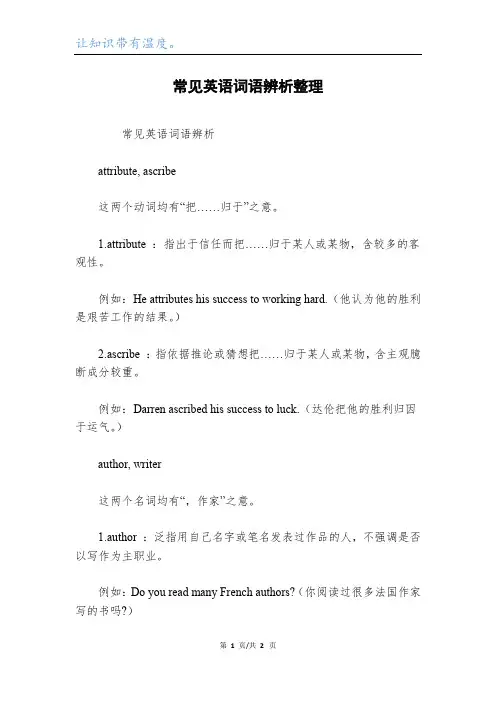
让知识带有温度。
常见英语词语辨析整理
常见英语词语辨析
attribute, ascribe
这两个动词均有“把……归于”之意。
1.attribute :指出于信任而把……归于某人或某物,含较多的客观性。
例如:He attributes his success to working hard.(他认为他的胜利是艰苦工作的结果。
)
2.ascribe :指依据推论或猜想把……归于某人或某物,含主观臆断成分较重。
例如:Darren ascribed his success to luck.(达伦把他的胜利归因于运气。
)
author, writer
这两个名词均有“,作家”之意。
1.author :泛指用自己名字或笔名发表过作品的人,不强调是否以写作为主职业。
例如:Do you read many French authors?(你阅读过很多法国作家写的书吗?)
第1页/共2页
千里之行,始于足下。
2.writer :含义广泛,一般指以写作为职业的人。
例如:Dickens was a famous English writer.(狄更斯是英国闻名作家。
)
【常见英语词语辨析】
文档内容到此结束,欢迎大家下载、修改、丰富并分享给更多有需要的人。
第2页/共2页。
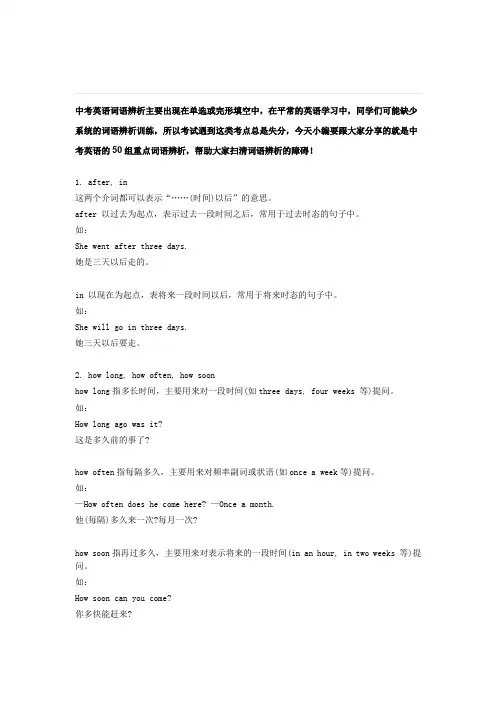
中考英语词语辨析主要出现在单选或完形填空中,在平常的英语学习中,同学们可能缺少系统的词语辨析训练,所以考试遇到这类考点总是失分,今天小编要跟大家分享的就是中考英语的50组重点词语辨析,帮助大家扫清词语辨析的障碍!1. after, in这两个介词都可以表示“……(时间)以后”的意思。
after 以过去为起点,表示过去一段时间之后,常用于过去时态的句子中。
如:She went after three days.她是三天以后走的。
in 以现在为起点,表将来一段时间以后,常用于将来时态的句子中。
如:She will go in three days.她三天以后要走。
2. how long, how often, how soonhow long指多长时间,主要用来对一段时间(如three days, four weeks 等)提问。
如:How long ago was it?这是多久前的事了?how often指每隔多久,主要用来对频率副词或状语(如once a week等)提问。
如:—How often does he come here? —Once a month.他(每隔)多久来一次?每月一次?how soon指再过多久,主要用来对表示将来的一段时间(in an hour, in two weeks 等)提问。
如:How soon can you come?你多快能赶来?3. few, a few, little, a little, several, somefew 和little的意思是否定的,表示“很少”或“几乎没有”;而a few和a little的意思是肯定的,表示“有一些,有一点儿”。
few 和 a few修饰可数名词;little 和 a little 修饰不可数名词。
several用于修饰可数名词,语意比a few和some更肯定,含有“好几个”的意思。
some可修饰可数名词,也可修饰不可数名词,从数量上说,它有时相当于a few 或 a little,有时指更多一些的数量。
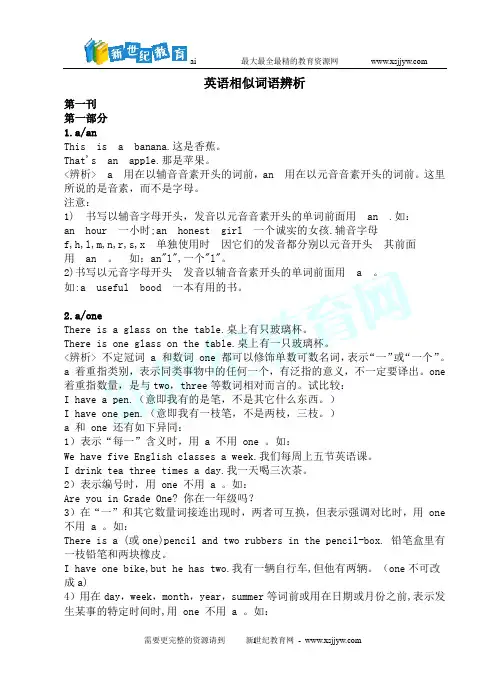
英语相似词语辨析第一刊第一部分1.a/anThis is a banana.这是香蕉。
That's an apple.那是苹果。
<辨析> a 用在以辅音音素开头的词前,an 用在以元音音素开头的词前。
这里所说的是音素,而不是字母。
注意:1) 书写以辅音字母开头,发音以元音音素开头的单词前面用an .如:an hour 一小时;an honest girl 一个诚实的女孩.辅音字母f,h,l,m,n,r,s,x 单独使用时因它们的发音都分别以元音开头其前面用an 。
如:an"l",一个"l"。
2)书写以元音字母开头发音以辅音音素开头的单词前面用 a 。
如:a useful bood 一本有用的书。
2.a/oneThere is a glass on the table.桌上有只玻璃杯。
There is one glass on the table.桌上有一只玻璃杯。
<辨析> 不定冠词 a 和数词 one 都可以修饰单数可数名词,表示“一”或“一个”。
a 着重指类别,表示同类事物中的任何一个,有泛指的意义,不一定要译出。
one 着重指数量,是与two,three等数词相对而言的。
试比较:I have a pen.(意即我有的是笔,不是其它什么东西。
)I have one pen.(意即我有一枝笔,不是两枝,三枝。
)a 和 one 还有如下异同:1)表示“每一”含义时,用 a 不用 one 。
如:We have five English classes a week.我们每周上五节英语课。
I drink tea three times a day.我一天喝三次茶。
2)表示编号时,用 one 不用 a 。
如:Are you in Grade One? 你在一年级吗?3)在“一”和其它数量词接连出现时,两者可互换,但表示强调对比时,用 one 不用 a 。
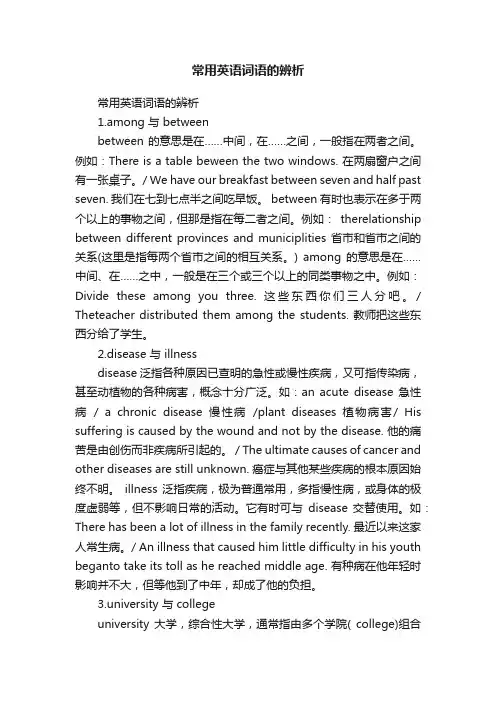
常用英语词语的辨析常用英语词语的辨析1.among 与 betweenbetween 的意思是在……中间,在……之间,一般指在两者之间。
例如:There is a table beween the two windows. 在两扇窗户之间有一张桌子。
/ We have our breakfast between seven and half past seven. 我们在七到七点半之间吃早饭。
between 有时也表示在多于两个以上的事物之间,但那是指在每二者之间。
例如:therelationship between different provinces and municiplities 省市和省市之间的关系(这里是指每两个省市之间的相互关系。
) among 的意思是在……中间、在……之中,一般是在三个或三个以上的同类事物之中。
例如:Divide these among you three. 这些东西你们三人分吧。
/ Theteacher distributed them among the students. 教师把这些东西分给了学生。
2.disease 与 illnessdisease 泛指各种原因已查明的急性或慢性疾病,又可指传染病,甚至动植物的各种病害,概念十分广泛。
如:an acute disease 急性病/ a chronic disease 慢性病/plant diseases 植物病害/ His suffering is caused by the wound and not by the disease. 他的痛苦是由创伤而非疾病所引起的。
/ The ultimate causes of cancer and other diseases are still unknown. 癌症与其他某些疾病的根本原因始终不明。
illness 泛指疾病,极为普通常用,多指慢性病,或身体的极度虚弱等,但不影响日常的活动。

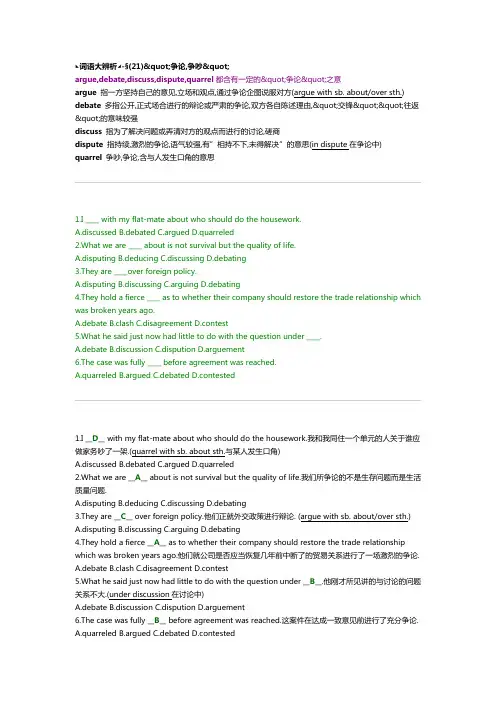
◣词语大辨析◢-§(21)"争论,争吵"argue,debate,discuss,dispute,quarrel都含有一定的"争论"之意argue指一方坚持自己的意见,立场和观点,通过争论企图说服对方(argue with sb. about/over sth.) debate多指公开,正式场合进行的辩论或严肃的争论,双方各自陈述理由,"交锋""往返"的意味较强discuss指为了解决问题或弄清对方的观点而进行的讨论,磋商dispute指持续,激烈的争论,语气较强,有”相持不下,未得解决”的意思(in dispute在争论中)quarrel争吵,争论,含与人发生口角的意思1.I ____ with my flat-mate about who should do the housework.A.discussedB.debatedC.arguedD.quarreled2.What we are ____ about is not survival but the quality of life.A.disputingB.deducingC.discussingD.debating3.They are ____over foreign policy.A.disputingB.discussingC.arguingD.debating4.They hold a fierce ____ as to whether their company should restore the trade relationship which was broken years ago.A.debateB.clashC.disagreementD.contest5.What he said just now had little to do with the question under ____.A.debateB.discussionC.disputionD.arguement6.The case was fully ____ before agreement was reached.A.quarreledB.arguedC.debatedD.contested1.I __D__ with my flat-mate about who should do the housework.我和我同住一个单元的人关于谁应做家务吵了一架.(quarrel with sb. about sth.与某人发生口角)A.discussedB.debatedC.arguedD.quarreled2.What we are __A__ about is not survival but the quality of life.我们所争论的不是生存问题而是生活质量问题.A.disputingB.deducingC.discussingD.debating3.They are __C__ over foreign policy.他们正就外交政策进行辩论. (argue with sb. about/over sth.)A.disputingB.discussingC.arguingD.debating4.They hold a fierce __A__ as to whether their company should restore the trade relationship which was broken years ago.他们就公司是否应当恢复几年前中断了的贸易关系进行了一场激烈的争论.A.debateB.clashC.disagreementD.contest5.What he said just now had little to do with the question under __B__.他刚才所见讲的与讨论的问题关系不大.(under discussion在讨论中)A.debateB.discussionC.disputionD.arguement6.The case was fully __B__ before agreement was reached.这案件在达成一致意见前进行了充分争论.A.quarreledB.arguedC.debatedD.contested◤词语大辨析◥-§22.arise,arouse,raise,rise四个形近词,你分清了吗?arise vi.突然出现;起床arouse vt.引起,唤醒,激起raise vt.举起,提高,较多地被用于具体的场合,如举手,举杯,升旗等;有时也用于提高工资,提高工作效率等rise vi.上升,升高,上涨等,大多用于抽象或比喻的场合,如太阳,蒸汽,产量的上升,有时也用于具体场合,如人的起立,河水的上涨等1.The wind is ____.A.risingB.raisingC.arousingD.arising2.Our wages have been ____ recently.A.risenB.raisedC.arousedD.arisen3.A new problem has ____.A.risenB.raisedC.arousedD.arisen4.He ____ her mothering instincts.A.roseB.raisedC.arousedD.arose5.He ____ at 6:30 a.m. as usual.A.roseB.raisedC.arousedD.arose6.The river ____ by two feet after the heavy rains.A.roseB.raisedC.arousedD.arose1.The wind is __A__.起风了.A.risingB.raisingC.arousingD.arising2.Our wages have been __B__ recently.最近我们的工资提高了.A.risenB.raisedC.arousedD.arisen3.A new problem has __D__.出现了一个新问题.A.risenB.raisedC.arousedD.arisen4.He __C__ her mothering instincts.他激起了她的母爱本能.A.roseB.raisedC.arousedD.arose5.He __D__ at 6:30 a.m. as usual.他像平常一样早晨6点半起床.A.roseB.raisedC.arousedD.arose6.The river __A__ by two feet after the heavy rains.暴雨使河水水位升高两英尺.A.roseB.raisedC.arousedD.arose◣词语大辨析◢-§(21)"争论,争吵"argue,debate,discuss,dispute,quarrel都含有一定的"争论"之意argue指一方坚持自己的意见,立场和观点,通过争论企图说服对方(argue with sb. about/over sth.)debate多指公开,正式场合进行的辩论或严肃的争论,双方各自陈述理由,"交锋""往返"的意味较强discuss指为了解决问题或弄清对方的观点而进行的讨论,磋商dispute指持续,激烈的争论,语气较强,有”相持不下,未得解决”的意思(in dispute在争论中)quarrel争吵,争论,含与人发生口角的意思1.I ____ with my flat-mate about who should do the housework.A.discussedB.debatedC.arguedD.quarreled2.What we are ____ about is not survival but the quality of life.A.disputingB.deducingC.discussingD.debating3.They are ____over foreign policy.A.disputingB.discussingC.arguingD.debating4.They hold a fierce ____ as to whether their company should restore the trade relationship which was broken years ago.A.debateB.clashC.disagreementD.contest5.What he said just now had little to do with the question under ____.A.debateB.discussionC.disputionD.arguement6.The case was fully ____ before agreement was reached.A.quarreledB.arguedC.debatedD.contested1.I __D__ with my flat-mate about who should do the housework.我和我同住一个单元的人关于谁应做家务吵了一架.(quarrel with sb. about sth.与某人发生口角)A.discussedB.debatedC.arguedD.quarreled2.What we are __A__ about is not survival but the quality of life.我们所争论的不是生存问题而是生活质量问题.A.disputingB.deducingC.discussingD.debating3.They are __C__ over foreign policy.他们正就外交政策进行辩论. (argue with sb. about/over sth.)A.disputingB.discussingC.arguingD.debating4.They hold a fierce __A__ as to whether their company should restore the trade relationship which was broken years ago.他们就公司是否应当恢复几年前中断了的贸易关系进行了一场激烈的争论.A.debateB.clashC.disagreementD.contest5.What he said just now had little to do with the question under __B__.他刚才所见讲的与讨论的问题关系不大.(under discussion在讨论中)A.debateB.discussionC.disputionD.arguement6.The case was fully __B__ before agreement was reached.这案件在达成一致意见前进行了充分争论.A.quarreledB.arguedC.debatedD.contested◤词语大辨析◥-§22.arise,arouse,raise,rise四个形近词,你分清了吗?arise vi.突然出现;起床arouse vt.引起,唤醒,激起raise vt.举起,提高,较多地被用于具体的场合,如举手,举杯,升旗等;有时也用于提高工资,提高工作效率等rise vi.上升,升高,上涨等,大多用于抽象或比喻的场合,如太阳,蒸汽,产量的上升,有时也用于具体场合,如人的起立,河水的上涨等1.The wind is ____.A.risingB.raisingC.arousingD.arising2.Our wages have been ____ recently.A.risenB.raisedC.arousedD.arisen3.A new problem has ____.A.risenB.raisedC.arousedD.arisen4.He ____ her mothering instincts.A.roseB.raisedC.arousedD.arose5.He ____ at 6:30 a.m. as usual.A.roseB.raisedC.arousedD.arose6.The river ____ by two feet after the heavy rains.A.roseB.raisedC.arousedD.arose1.The wind is __A__.起风了.A.risingB.raisingC.arousingD.arising2.Our wages have been __B__ recently.最近我们的工资提高了.A.risenB.raisedC.arousedD.arisen3.A new problem has __D__.出现了一个新问题.A.risenB.raisedC.arousedD.arisen4.He __C__ her mothering instincts.他激起了她的母爱本能.A.roseB.raisedC.arousedD.arose5.He __D__ at 6:30 a.m. as usual.他像平常一样早晨6点半起床.A.roseB.raisedC.arousedD.arose6.The river __A__ by two feet after the heavy rains.暴雨使河水水位升高两英尺.A.roseB.raisedC.arousedD.arose◣词语大辨析◢-§(21)"争论,争吵"argue,debate,discuss,dispute,quarrel都含有一定的"争论"之意argue指一方坚持自己的意见,立场和观点,通过争论企图说服对方(argue with sb. about/over sth.) debate多指公开,正式场合进行的辩论或严肃的争论,双方各自陈述理由,"交锋""往返"的意味较强discuss指为了解决问题或弄清对方的观点而进行的讨论,磋商dispute指持续,激烈的争论,语气较强,有”相持不下,未得解决”的意思(in dispute在争论中)quarrel争吵,争论,含与人发生口角的意思1.I ____ with my flat-mate about who should do the housework.A.discussedB.debatedC.arguedD.quarreled2.What we are ____ about is not survival but the quality of life.A.disputingB.deducingC.discussingD.debating3.They are ____over foreign policy.A.disputingB.discussingC.arguingD.debating4.They hold a fierce ____ as to whether their company should restore the trade relationship which was broken years ago.A.debateB.clashC.disagreementD.contest5.What he said just now had little to do with the question under ____.A.debateB.discussionC.disputionD.arguement6.The case was fully ____ before agreement was reached.A.quarreledB.arguedC.debatedD.contested1.I __D__ with my flat-mate about who should do the housework.我和我同住一个单元的人关于谁应做家务吵了一架.(quarrel with sb. about sth.与某人发生口角)A.discussedB.debatedC.arguedD.quarreled2.What we are __A__ about is not survival but the quality of life.我们所争论的不是生存问题而是生活质量问题.A.disputingB.deducingC.discussingD.debating3.They are __C__ over foreign policy.他们正就外交政策进行辩论. (argue with sb. about/over sth.)A.disputingB.discussingC.arguingD.debating4.They hold a fierce __A__ as to whether their company should restore the trade relationship which was broken years ago.他们就公司是否应当恢复几年前中断了的贸易关系进行了一场激烈的争论.A.debateB.clashC.disagreementD.contest5.What he said just now had little to do with the question under __B__.他刚才所见讲的与讨论的问题关系不大.(under discussion在讨论中)A.debateB.discussionC.disputionD.arguement6.The case was fully __B__ before agreement was reached.这案件在达成一致意见前进行了充分争论.A.quarreledB.arguedC.debatedD.contested◤词语大辨析◥-§22.arise,arouse,raise,rise四个形近词,你分清了吗?arise vi.突然出现;起床arouse vt.引起,唤醒,激起raise vt.举起,提高,较多地被用于具体的场合,如举手,举杯,升旗等;有时也用于提高工资,提高工作效率等rise vi.上升,升高,上涨等,大多用于抽象或比喻的场合,如太阳,蒸汽,产量的上升,有时也用于具体场合,如人的起立,河水的上涨等1.The wind is ____.A.risingB.raisingC.arousingD.arising2.Our wages have been ____ recently.A.risenB.raisedC.arousedD.arisen3.A new problem has ____.A.risenB.raisedC.arousedD.arisen4.He ____ her mothering instincts.A.roseB.raisedC.arousedD.arose5.He ____ at 6:30 a.m. as usual.A.roseB.raisedC.arousedD.arose6.The river ____ by two feet after the heavy rains.A.roseB.raisedC.arousedD.arose1.The wind is __A__.起风了.A.risingB.raisingC.arousingD.arising2.Our wages have been __B__ recently.最近我们的工资提高了.A.risenB.raisedC.arousedD.arisen3.A new problem has __D__.出现了一个新问题.A.risenB.raisedC.arousedD.arisen4.He __C__ her mothering instincts.他激起了她的母爱本能.A.roseB.raisedC.arousedD.arose5.He __D__ at 6:30 a.m. as usual.他像平常一样早晨6点半起床.A.roseB.raisedC.arousedD.arose6.The river __A__ by two feet after the heavy rains.暴雨使河水水位升高两英尺.A.roseB.raisedC.arousedD.arose。
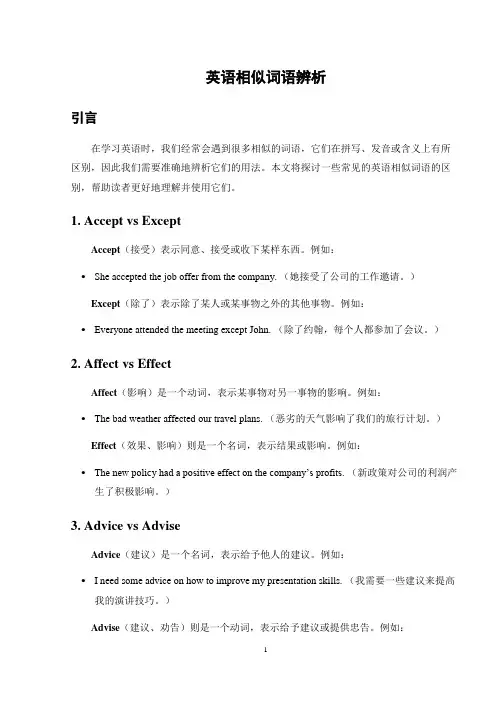
英语相似词语辨析引言在学习英语时,我们经常会遇到很多相似的词语,它们在拼写、发音或含义上有所区别,因此我们需要准确地辨析它们的用法。
本文将探讨一些常见的英语相似词语的区别,帮助读者更好地理解并使用它们。
1. Accept vs ExceptAccept(接受)表示同意、接受或收下某样东西。
例如:•She accepted the job offer from the company. (她接受了公司的工作邀请。
)Except(除了)表示除了某人或某事物之外的其他事物。
例如:•Everyone attended the meeting except John. (除了约翰,每个人都参加了会议。
)2. Affect vs EffectAffect(影响)是一个动词,表示某事物对另一事物的影响。
例如:•The bad weather affected our travel plans. (恶劣的天气影响了我们的旅行计划。
)Effect(效果、影响)则是一个名词,表示结果或影响。
例如:•The new policy had a positive effect on the company’s profits. (新政策对公司的利润产生了积极影响。
)3. Advice vs AdviseAdvice(建议)是一个名词,表示给予他人的建议。
例如:•I need some advice on how to improve my presentation skills. (我需要一些建议来提高我的演讲技巧。
)Advise(建议、劝告)则是一个动词,表示给予建议或提供忠告。
例如:•I would advise you to take some time off and relax. (我建议你休假一段时间,放松一下。
)4. Complement vs ComplimentComplement(补充、补足)是一个名词或动词,表示使完整或表示一件事物是另一件事物的补充。
初中英语300组常用词语辨析(3)§201grow / keep / raise / plantⅠ. grow & plant 都可表示“种植”如种植草、树、苗、花卉粮食等植物。
grow 着重指种植以后的栽培、管理过程。
plant 着重指“种植”这一行为。
某人plant a tree 之后,树是死是活,不一定管,但某人grow a tree 则包括培育管理,使其生长的过程。
如:① The students are planting trees on the hill. 学生们正在山坡上栽树。
(不用grow ) ② The farmer grows wheat in this field.那位农民在这块田里种植小麦。
(不用plant ) ③ People grow bananas in Hainan. 海南种植香蕉。
(不用plant )Ⅱ. keep 表“赡养”后可接表人或动物的名词,不用来代替plant 或grow. 如: He has a wife and three children to keep. 他要养活妻子和三个孩子。
Ⅲ. raise 除表“饲养(动物)”以外,还可表示“教育(子女)”; “培育(植物)”。
如: Where were you raised ? 你在哪儿长大?[注]:raise 强调从小精心培养到大,通常指培养花卉以及较难管理的植物。
如:Let ’s grow / raise some flowers in the garden.咱们在园子里种些花吧。
We grow rice, wheat and cotton in my hometown. 在家乡,我们种植水稻、小麦和棉花。
(不宜用raise )§202 glad/ happy/merry/ pleased 这组形容词都有:“高兴、快乐”之意。
Ⅰ.glad 多用在与人见面时的客套语中,指使人感到:情绪上有短暂的喜悦,常用作表语,一般情况下不作定语。
初中英语常用词语辨析A...。
...。
...。
..。
....。
.。
...。
.......。
.。
..。
.。
..。
.。
.。
1。
at the moment\in a moment\for a moment\at the moment=right now”此时此刻”,用于现在时.in a moment = very soon “很快,立即”,一般用于将来时的句子.for a moment “此刻,一会儿”表示时间的延续。
[例] He is out at the moment。
此刻他不在家.I will come back in a moment.我一会儿就回来。
Hold on for a moment.请稍候。
.。
..。
.。
......。
...。
.。
..。
.。
.....。
.。
..。
.。
.。
.。
...。
.。
2.a few/ few(1)a few, few 用来修饰可数名词。
(2)a few “有一些”,表示肯定概念,few 几乎没有,表示否定意义。
[例] The man has been here for many years, so he has a few friends。
这个人在这里住了很多年了,他有一些朋友.I am a new comer here, so I have few friends here.我刚来到这里,所以我在这里没有几个朋友。
.。
..。
.。
.。
..。
............。
.。
.。
.。
.。
..。
.。
.。
.。
.。
... 3.a little/ little(1) a little, little 用于修饰不可数名词。
(2) a little “有一些”,表示肯定概念.little “几乎没有",表示否定概念.[例] There is a little water in the glass.杯子里有一些水。
There is little water in the glass, so you can’t drink any.杯子里几乎没有水了,你不可能喝到水了. 。
bide, adhere, conform, complyabide v.后接by表示“遵守,同意”。
I will abide by the director' decision.我将遵从主任的决定。
adhere v.后接to表示“遵守”。
(当然adhere一词的其它意思如“坚持;粘附”也经常被考到。
)Car drivers must adhere to the rules of driving.汽车司机必须遵守驾驶规则。
conform v.后接to表示“遵守,符合”。
All individuals are required to conform to the laws made by their gov ernments.每个人都应该遵守政府制订的法律。
comply v.后接with表示“遵守,服从”,用于正式的场合。
Our company complies with governmental regulations on paying taxes.我们公司遵守政府有关纳税的规定。
abnormal, uncommon, disorderedabnormal a.不正常的,反常的(但并非罕见),指行为或现象(如气候)的异常。
His body temperature has been abnormal for 3 days, the highest point reaching 40.5 degree centigrade.他的体温三天来一直都不正常,最高的时候达到40.5摄氏度。
(尽管身体发烧不正常,但生活中也时有发生。
) uncommon a.罕见的,不平常的,指很少经历或很少见到的状况;特别的,出色的。
Hurricanes are uncommon in England.飓风在英国非常罕见。
That is uncommon instant coffee; it tastes great!那速溶咖啡质量上乘,味道好极了!disordered a.混乱的,杂乱的;(精神或身体)有病的。
中考英语词汇辨析1.spend,pay,cost,takesb. spend +时间/金钱 on sth. 某人在…上花费时间/金钱e.g. I spend two hours on English every day. 我每天花两小时学英语。
sb. spend +时间/金钱 (in) doing sth. 某人花费时间/金钱做某事e.g. Tom spends 5 dollar updating his computer system. Tom花五美元更新他的电脑系统。
sb. pay + 金钱 for…某人在...上花费金钱e.g. I paid 100 yuan for the shirt. 我花100元买这件T恤。
sth. cost sb. + 金钱/时间…花了某人的金钱/时间(cost的用法中,花金钱的出现频率比花时间高)e.g. It costs him ten euros. 它花了他十欧元。
It takes/took sb. +时间/金钱 to do sth. 花了某人时间/金钱做某事It takes me 6 minutes to take a shower. 冲澡花了我6分钟。
… take sb. +时间/金钱. …花了某人时间/金钱。
注意:spend和pay主语通常是人,而cost和take主语通常是物。
2.“at,on,in + 时间”at, on, in+时间,均可表示"在……的时候"。
at + 具体的时间点I get up at six o'clock in the morning . 我早晨六点起床。
Breakfast would be finished at seven.早餐将在七点结束。
on+具体某一天或具体某一个早上(下午、晚上)on Monday 在星期一on Sunday morning 在星期天早上(特指)on July 1st 在七月1日on a cold night in 1938 在1938年的一个寒冷的晚上in+具体某一年(季、月),早上,下午,晚上in 2020 在2020年in September 在九月in the morning 在早上(泛指)in the evening 在晚上可见at后跟的时间更精准,on次之,in排在最后。
1.elder 与elderly两者都为“年⽼的”,但有细微的差别。
elderly 指中年与暮年之间的年龄,表⽰⼈已过中年,因此,这词常⽤来代替 old。
如:an elderly gentleman. ⼀位年长的绅⼠。
elder指年龄稍长者,适⽤于家庭的兄弟姐妹之间。
如: Tom is the elder of the two.汤姆是两个孩⼦中较⼤的⼀个。
2.precious 和 expensiveexpensive 表⽰“昂贵的”。
如:The drink was cheap , but the food was very expensive . 饮料很便宜,但⾷物很贵。
precious 表⽰“珍贵的,宝贵的”。
如:The children are precious to me . 孩⼦们对我来说很重要。
3.regret to do 和 regret doingregret doing 表⽰“做了某事⽽感到遗憾或后悔”,v-ing 动作发⽣在regret 之前。
如:I regretted missing the train. 我为没有赶上⽕车⽽感到很懊恼。
regret to do 指“当时或现在遗憾地做什么”。
如:I regret to tell you that we can 't stay here any longer. 我遗憾地告诉你,我们不能在这⼉多呆了。
4.day by day 和 day after day两词组意思很近,但有区别:day by day 只⽤作状语,表⽰“⼀天天地”, 有逐渐转变的意思。
如:Day by day she seems to grow a little taller.她似乎⼀天天地长⾼了。
day after day 可作主语,宾语等,亦可作状语,表⽰“⼀天⼜⼀天”,强调动作的重复,表⽰时间的长久。
如: We do the same work day after day. 每天我们做着同样的事情。
初中英语 300 组常用词语辨析(1)Lesson11. a bit/ a little这两个词都意为“一点儿”有时可以互换,但有时不能。
Ⅰ.二者作程度副词修饰形容词、副词、动词或比较级时,意义相同,为“一点儿”“有些”。
如:①I am a bit / a little hungry. 我有点饿。
②He walked a bit / a little slowly. 他走路有点慢。
Ⅱ.二者都可以作名词词组,充当主语或宾语。
如:①A little / bit is enough for me. 我有一点儿就够了。
②I know only a little / a bit about her. 我对她的情况只了解一点。
Ⅲ。
a little 可直接修饰名词;a bit 后须加of 才可以。
如:①. There is a little water in the bottle. = There is a bit of water in the bottle.[注意]a little of后的名词通常特指,表“……中的一些”,如:①May I have a little of your tea?Ⅳ. 否定形式 not a little 作状语,相当于very/ quite, “很”,“非常”;作定语和宾语时,相当于much, 意为“许多”。
而not a bit 作状语时,相当于not at all, 意为“一点也不”,作宾语时则相当于not much. Eg:①He is not a little (=very) hungry. 他饿极了。
②He is not a bit (=not at all) hungry.他一点也不饿。
③She ate not a little (=much). 她吃得很多。
Ⅴ. Not a bit中的not 可以分开使用;not a littl e 中的not 则不能分开。
Eg:①He felt not a bit tired. = He didn’t feel a bit tired. 他觉得一点也不累。
几组常见英语词语辨析
一、work hard, hard-working and hard work
●work hard 动词短语,“努力工作,努力学习”,work是动词,hard是副
词。
●hard-working 形容词,“勤奋的,勤勉的,努力工作的”。
●hard work 名词短语,“艰苦的工作”,work是名词,hard 是形容词。
Eg.
1. The girl works hard. 这个女孩工作很认真。
2. She is a hard-working girl. 她是一个工作很认真的女孩。
3. It is hard work to deal with the problem. 处理这个问题是很艰巨的工作。
二、electric, electrical,electronic
1. electric“电的,用电的,带电的”,指任何电动的或发电的装置,被修饰的物体本身可带电。
如:
electric light, electric stove, electric piano, electric motor, electric bell。
又如:
Please connect the two electric wires. 请将这两根电线接起来。
With this electric blanket, the grandpa won't feel cold in winter. 有了电热毯,到了冬天爷
爷就不觉得冷了。
2.electrical“电的,与电有关的,电气科学的”,指与电有关的事物,被修饰的词本身并不能带电。
如:electrical engineer, electrical energy, electrical engineering。
又如:All the electrical work was done by my younger brother. 所有的电工活都由弟弟来干。
He buried himself in an electrical book. 他埋头读一本电学方面的书。
3. electronic“电子的,和电子有关的”
三、Efficient, effective, efficiency, effectiveness
efficient: [i'fiʃənt] a.
1. 效率高的;有能力的,能胜任的[(+in)]
He is an efficient manager.
他是一位办事效率高的经理。
2. (直接)生效的;有效的;收效大的
It is not efficient to hire poorly trained workers.
雇用未经严格训练的工人会妨碍工作效率。
effective:[i'fektiv] a.
1. 有效的[(+against/in)][+to-v]
Window screens are effective in keeping out mosquitoes.
纱窗能有效地挡住蚊子。
2. (法律等)生效的,起作用的[Z]
A bill passed by congress becomes effective as soon as the President signs it. 国会通过的法案一经总统签署立即生效。
3. 给人深刻印象的,有力的
That's rather an effective use of color.
那样使用颜色效果甚佳。
efficiency :[i'fiʃənsi] n. [U]
1. 效率;效能;功效
These machines have increased our work efficiency many times.
这些机器使我们的工作效率提高了许多倍。
2. 【物】效率
effectiveness:[ə'fektivnis] n. [U]
有效性; 【心理学】效率。